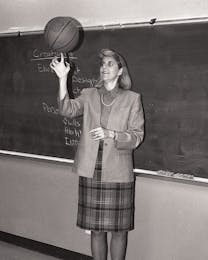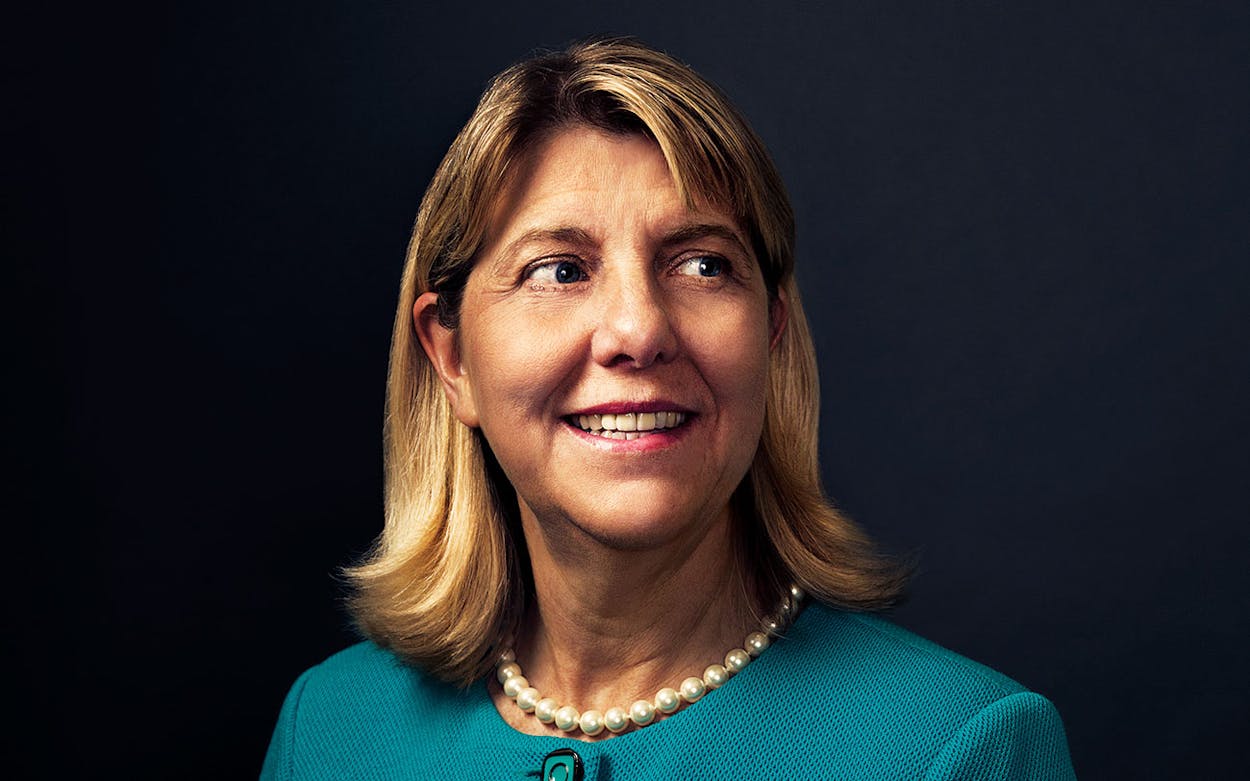This article originally appeared in the September 2017 issue of Texas Monthly with the headline “Called to Lead.”
In 1991, after finishing the coursework for her Ph.D. in management and organizational behavior at Oklahoma State University, Linda Livingstone headed five hours south to Waco to take a job as an assistant professor at Baylor University. She stayed for eleven years before leaving to work her way up the administrative ranks, first at Pepperdine University and then at George Washington. She returned to Baylor this summer, to serve as its fifteenth president at a time when the school has been ensnared in scandal. In May of last year, her predecessor, Ken Starr, was removed and football coach Art Briles was fired after a report by the law firm Pepper Hamilton revealed systemic failings in how the school had responded to allegations of sexual assault.
Tim Taliaferro: A month in, what is the most common question you get?
Linda Livingstone: Why I decided to come back after having been away for about fifteen years.
TT: Why did you?
LL: It was a great opportunity to return to a place that I love and that had been really important to me and my family. The university’s aspiration to be a preeminent research university while maintaining an unapologetic Christian mission is to me a noble aspiration and one that very few universities have achieved.
TT: What do you mean by “unapologetic Christian mission”?
LL: I mean we don’t shy away from it. It is embedded throughout the experience that people have at Baylor. Lots of universities that were originally faith based drifted over time, and it is no longer a core part of who they are. We intend to stay true to our roots.
TT: What were your biggest impressions of the Pepper Hamilton report?
LL: Every university should read the findings of fact and the recommendations for how to deal with sexual violence on campus. Because I have a history with Baylor, it was painful for me to read. But it’s clear to me now that the university has made tremendous progress. Baylor is a very different place than it was last year.
TT: What was your first experience like at Baylor?
LL: I was working on my Ph.D. at OSU and a colleague asked if I had ever considered Baylor [for a teaching position]. She knew I was a Christian and knew my values. Four years later, when I was looking for a job, Baylor, by good fortune and God’s blessing, had an opening in my field. It was clear when my husband and I came here that it was exactly the right place. We felt God calling us to Baylor.
TT: You have quite the athletic family. You were a four-year letter winner in basketball at Oklahoma State, and your husband played basketball there. Your daughter plays volleyball at Rice.

LL: And my father and father-in-law played college basketball and some pro.
TT: Are you a football fan?
LL: Absolutely. I love collegiate sports.
TT: What would you say is the state of Baylor football?
LL: I’m excited about the state of Baylor football. Matt Rhule was a great hire. He obviously cares about having a good team but also about raising good young men. Coach Rhule is embodying what we think is important about Baylor: embracing the Christian mission and setting high expectations on and off the field.
TT: When you have a chance to talk to the football team, what message do you intend to give them?
LL: My dad grew up picking cotton. He got to go to college because of a basketball scholarship. If not for that, he would never have gotten out of the cotton fields. He won the 1945 national championship and became a coach. That started a trajectory of the rest of us going to college. Now his daughter is a college president. My message to these athletes is that very few people have that opportunity. Take advantage of it, but recognize the responsibility.
TT: Do you believe Baylor has been unfairly targeted?
LL: What happened at Baylor was very serious. It is clear from the findings of fact that there were a number of things that had been done or were not being done. I’m not going to judge what others think. At Baylor, we have to make the right decisions and be forthright with people about them.
TT: Has Baylor’s string of lawsuits and bad press had any effect on applications?
LL: This will probably be our strongest and most diverse freshman class. Our fund-raising was very strong—we raised over $100 million, slightly higher than the year before. Our freshman retention rate is at
90 percent, the highest ever.
TT: What do you take away from those numbers?
LL: That we are a really strong university with a unique mission. Our Christian mission is at the core of who we are. We will work through the issues. But there’s still a great desire for and need for the unique experience Baylor provides.
TT: Have you turned to your faith at all during this period?
LL: Absolutely. Anytime you take on a leadership position you need to be clearly grounded in your core values. I try to focus on my own faith and prayer to stay grounded.
TT: Any Scripture that guides you?
LL: One that I reflect on is Micah 6:8. “And what does the Lord ask of you? To act justly.”
This interview has been edited for clarity and length.







